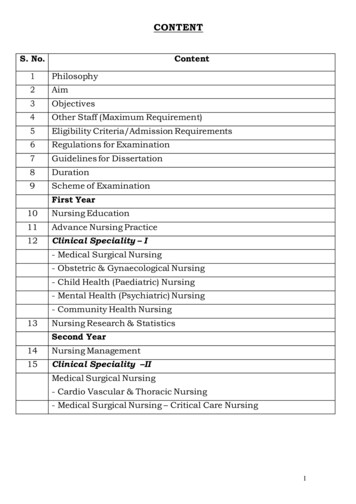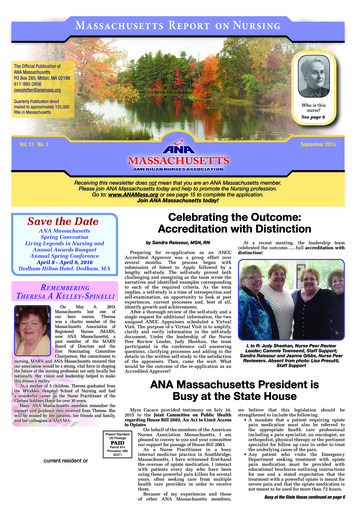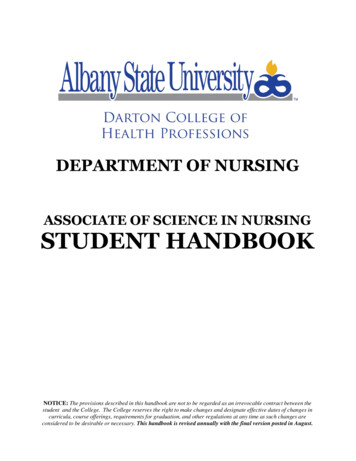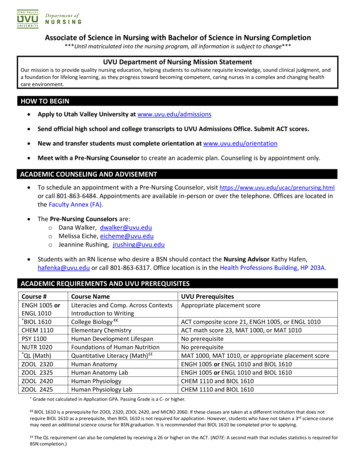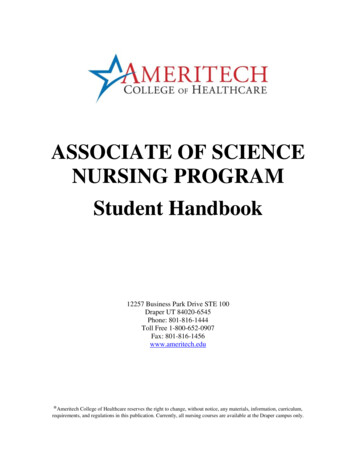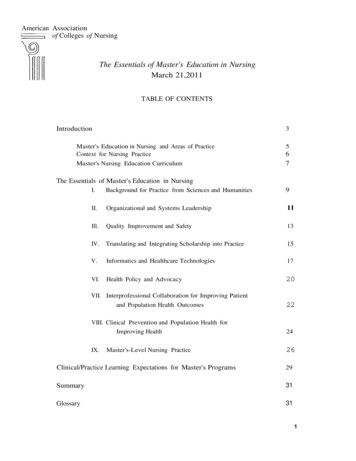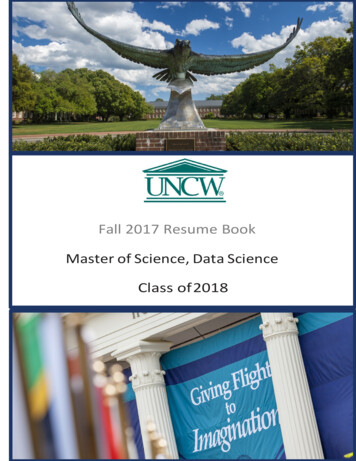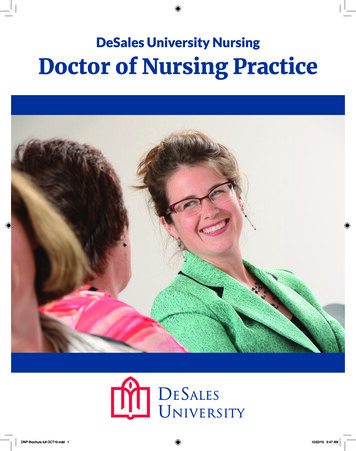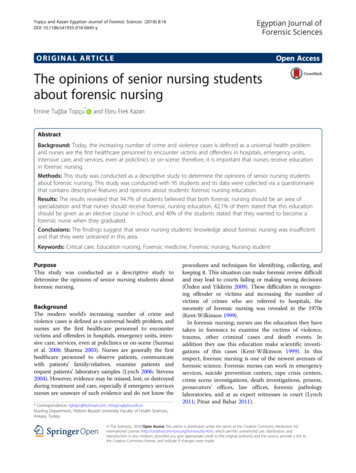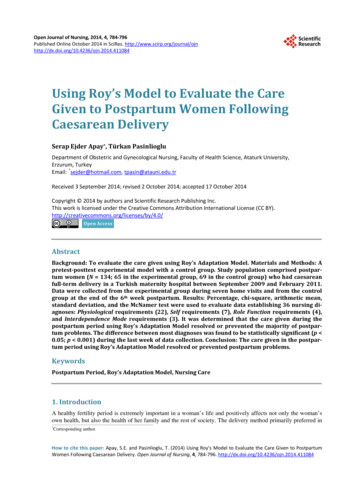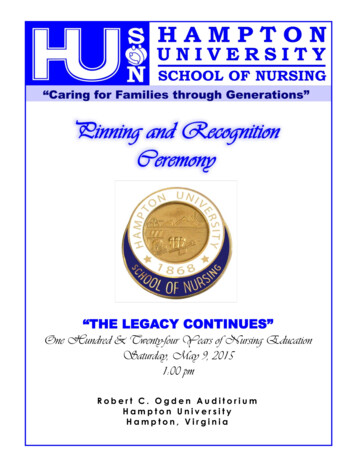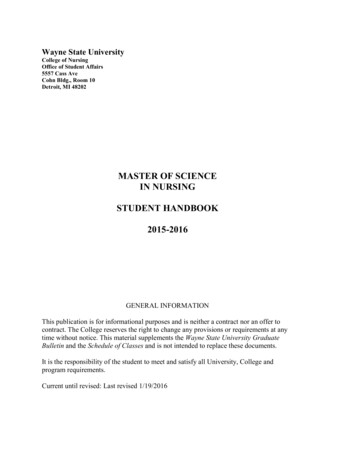
Transcription
Wayne State UniversityCollege of NursingOffice of Student Affairs5557 Cass AveCohn Bldg., Room 10Detroit, MI 48202MASTER OF SCIENCEIN NURSINGSTUDENT HANDBOOK2015-2016GENERAL INFORMATIONThis publication is for informational purposes and is neither a contract nor an offer tocontract. The College reserves the right to change any provisions or requirements at anytime without notice. This material supplements the Wayne State University GraduateBulletin and the Schedule of Classes and is not intended to replace these documents.It is the responsibility of the student to meet and satisfy all University, College andprogram requirements.Current until revised: Last revised 1/19/2016
TABLE OF CONTENTSOVERVIEWHistory . . .iMission Statement . .iPhilosophy .iiCollege of Nursing Administrative Structurei .iiOffice of Student Affairs., .ivACADEMICSAcademic Regulations . . .1Scholarship . 1Probation .2Exclusion .2Attendance . .3Residency Requirements . .3Transfer of Graduate Credit .3Extension Credits .3Graduate Course Repeat Policy .3Withdrawal from Nursing Courses. .4Authorized Leave of Absence Policy .5Scholarship Guidelines . .6Course Grading Scale . 6Distance Learning Policies and Procedures .6Examination Policy . . . 6CMA-D Qualifications and Exceptions .6Distance Course Scheduling and Admissions. 7Distance Program Class Size, Locations and Cohort Numbers . 7MSN Curricular Designs . . 9Psychiatric-Mental Health Nurse Practitioner 9Nurse-Midwife. . . . .9Neonatal Nurse Practitioner . . .10Pediatric Acute Care Nurse Practitioner . 11Pediatric Primary Care Nurse Practitioner . . 11Advanced Public Health Nursing . . . 12Graduate Certificate Programs .13Nursing Education . . .13Nurse-Midwife . .13Pediatric Primary Care Nurse Practitioner .14Pediatric Acute Care Nurse Practitioner . . .14Academic Program Planning . . . . 15Requirements for the Clinical Experience . . .16ACEMAPP . . . . 16Health Clearance . . . .16BCLS – Level C or ACLS . . . 16Flu Vaccine . . 17Liability Insurance . . .17Maintaining Licensure . 17
Criminal Background Investigation . . .17Urine Drug Screen . . .18Clinical Attire . .18ID Badge . . 18Check List for Clinical Requirements . . 19Resources . . . 20Skill Laboratory . . . 20Physical Assessment Learning Laboratory . . 20Office of Health Research. . . 20Simulation Lab . 20Faculty and Student Responsibilities .21Professional Integrity Policy 21Responsibilities of Faculty Members .21Responsibilities of Students .23University guidelines assisting persons with behavioral problems .23College of NursingAcademic Appeal Policy .24Basic Principles of the Appeals Process. . 24Grade AppealGrounds for Appeals .24Initiating a Formal Appeal .25University Level Academic Appeal Procedure . . 26Unsafe Practice 27Student Code of Conduct .30Preamble . .30Definitions . 30Proscribed Conduct . .32Prohibited Conduct . .32Disciplinary Sanctions 34Communication of Notice . 35Interim Suspension . 36Hearing Committee Panels . 37Student Conduct Officer .37Preliminary Procedure . . 38Procedure in Non-Academic Misbehavior Cases . . 42Procedure in Academic Misbehavior Cases . . 42Informal Disciplinary Conference 44Hearing Procedures . . 44Hearing by Committee . 46Student Organizations . .47Appeal Process . . 48Inherent Authority . 48Graduation . .49Degree Requirements 49Application for Degree .49
Commencement . 49Convocation .49UniversityStudent Services . .50Academic Advisors . 50Academic Success Center . . 50Athletics . 50Bookstore (Barnes & Noble) .50Career Services .51Cashier .51Computer and Information Technology . . .51Counseling and Psychological Services . . .51Duplicating . 51Educational Accessibility Services . . . . 52Office of Equal Opportunity . . . .52Food Services . . 52Housing Office . .52Libraries . . . 52Office of International Students and Scholars . . . 53Ombudsperson . . . .54Parking . . . 54Public Safety-Emergencies . . .54Recreation and Fitness Center . .54Registration/Records . .55Religious Centers . .55Religious Observances . . . .55Scholarships and Financial Aid, Office of . .55The South End . . .56Student Accounts Receivable . .56Student Center . .56Student Council .56Student Resource and Assistance Center . . .57Testing, Evaluation, and Research . .57Theatre Main Office . .57University Advising Center . . .57Office of Military and Veterans Educational Benefits . . .57WSU One Card . . .57College of Nursing . . 57Scholarships and Emergency Loans . . .57Mailboxes . . . 58Bulletin Boards .58Student Organizations . . . 58Standing Committees with Student Representative Positions . .59
OVERVIEW OF COLLEGEHistoryThe College of Nursing began in 1930 as one of the departments of the College of LiberalArts. During the first fifteen years the nursing programs became so varied, the enrollmentso large, and the contribution to the total community so important that reorganization wasnecessary. In 1944, at the request of the College of Liberal Arts, the Board of Educationauthorized the establishment of the College of Nursing. The College began to function asone of the components of the University in the spring of 1945.In 1947 under the leadership of Katherine Faville, the College’s first dean, the facultyassumed full responsibility for teaching clinical nursing courses. This was the first time theshifting of clinical teaching from hospital staff to nursing faculty was initiated. This modelhas now been incorporated by colleges and schools of nursing. Graduates from thisprogram were eligible to take the examination for the registered nurse license.Since 1945, the College has had programs leading to the degree of Master of Science in Nursing.These programs offer advanced practice preparation for nurse practitioners and clinical nursespecialists.In 1975, the College began offering a program leading to the Doctor of Philosophy inNursing. The Ph.D. summer option was initiated in 1984.Our MissionThe mission of the College of Nursing is to create and translate knowledge and to educatea diverse student body prepared to excel as clinicians, scholars, and leaders who improvehealth in local and global communities.VisionThe College of Nursing will be the leader in nursing research and education, known forour commitment to and impact on urban health.MSN Terminal Objectives1. Practices advanced nursing from a holistic, evidence-based perspective that isethically, culturally congruent and economically sound.2. Develops skills for leadership and quality improvement in complex organizationalsystems.3. Analyzes the impact of informatics and technology on the delivery and outcomes ofhealthcare in diverse settings.4. Implements healthcare policies and advocates for patients and the nursing professionthrough interaction with organizational, local, state, and/or federal-level policymakers.
5. In collaboration with interdisciplinary colleagues, practices advanced nursing thatfocuses on health-promoting and risk-reduction interventions to achieve optimalpatient and population health outcomes.i.
PhilosophyThe College of Nursing functions within the context of Wayne State University and supports thecentral goals and mission of the University. These goals are to nurture the intellectual abilities ofstudents and faculty and to provide education, research, and community service. As an urbanuniversity, Wayne State accepts responsibility for a reciprocal partnership with the community,using resources and knowledge in dealing with urban life.Nursing is an academic discipline and profession. As a discipline, nursing develops its body ofknowledge using research as the major mode of discovery and validation. The scholarlyenvironment of the university enhances the research and theory development endeavors of theCollege of Nursing. As a profession, nursing uses knowledge creatively in response to the healthcare needs of society. Experience in a variety of clinical settings is the primary mode for thedevelopment of practice competencies. The urban context of the University provides a setting forexploring the application of knowledge to professional nursing practice.The concepts that order the discipline and profession of nursing are derived from knowledge abouthuman beings, health care, and environment. These concepts give identity to professional nursingpractice, direct inquiry, and theory development.The College of Nursing supports the importance of the liberal arts, the humanities, and sciences innursing education. The faculty believes that programs designed for the preparation of nurses mustbe composed of the intellectual, social, and technical components of a liberal and professionaleducation that are available to students within an institution of higher learning.Faculty affirms the necessity and value of clinical practice within a professional nursing program.Experience in a variety of clinical settings is the primary mode for the development of practicecompetencies. Faculty believes that learners are self-directed and actively participate in thelearning process. Self-direction encourages the development of personal goals and valuessignificant to the profession of nursing. Knowledge acquisition, capacity for critical inquiry,reflection and decision making prepares learners for responding to issues that confront them asprofessionals.Learners from diverse backgrounds enter the College of Nursing to begin or continue theireducation within the academic discipline of nursing. The faculty believes the diversecharacteristics of its students add to the richness of the learning experience. The program seeks toaccommodate the special needs, interests, and abilities of the students. The faculty supports theright of students to question, challenge, and debate within the context of inquiry as an essentialingredient in the students’ development. Continuing evaluation on the part of students and facultyis essential to sustain the integrity of the program.The faculty of the College of Nursing, as members of the academic community, recognizes that itsprofessional functions extend beyond contributions to formal teaching. Research, practice, andcommunity service are also expectations of the faculty role. The faculty views as essentialacademic freedom, shared governance, opportunity to develop knowledge, and responsibility toincorporate new knowledge into teaching and nursing practice. The faculty assumes responsibilityfor enhancing the image of the College of Nursing and the University locally and nationallythrough various avenues including research, scholarship, practice, consultation, and participatorydecision making.ii.
ADMINISTRATIVE STRUCTUREiii.
OFFICE OF STUDENT AFFAIRSCollege of Nursing - Office of Student Affairs (OSA)10 Cohn313 577-4082, toll free 888 837-0847E-mail: nursinginfo@wayne.eduFAX: 313 577-6949website: www.nursing.wayne.eduThe Office of Student Affairs (OSA) is responsible for a variety of activities, including recruitment, application,admission, orientation, retention, academic support, and undergraduate academic advising. The Office also managesthe admissions, enrollment, registration, financial aid and the scholarship programs of the College.Eric BrownDirectorADMINISTRATIONAreas of ResponsibilityAdministrative responsibility for the Office of StudentAffairseric.brown@wayne.eduDawn PauliManager, Student RelationsAdministrative responsibility includingcommunications, student activities, outreach,admissions and graduation activities.dawn.pauli@wayne.eduACADEMIC STAFFDennis BesteAcademic Services Officer Admission to DNP Programs Advisor to admitted undergraduate students - lastnames A-Ldennis.beste@wayne.eduKristen CarneyAcademic Services Officer Admission to PhD Programs Advisor to admitted undergraduate students - lastnames M-Zkristen.carney@wayne.eduFelicia GraceAcademic Services Officer IV Admission to MSN Program and GraduateCertificates Student Educational Support Servicesfgrace@wayne.eduAlton JamesAcademic Services Officer Advisor to Future Nurse Professionals and VeteransBSN studentsalton.james@wayne.eduChristian LittleAcademic Services Officer Recruitment and admission for RN to BSN programat the Wayne – Oakland Center Advisor to admitted undergraduate students in theOakland CenterChristian.little@wayne.eduSUPPORT STAFFDeleanna AllenStudent Assistant Servicing students, front counter andtelephone assistanceEw3755@wayne.eduSamantha KluzStudent Assistant Servicing students, front counter andtelephone assistanceEv4641@wayne.eduiv.
ACADEMICSAcademic RegulationsThe College has high standards for academic achievement and professionalism. Students are expected tomeet these standards of excellence. The following scholarship policies must be achieved to enable astudent to progress toward degree completion.ScholarshipThe graduate grading system is intended to reflect high standards of scholarship. The followingare policies for academic progression for graduate students:1. All admitted students are master’s applicants until they have completed their first 12credit hours of graduate study in the College. A student must maintain a grade pointaverage (GPA) of 3.0 or better for advancement from master’s applicant status tomaster’s candidate status.2. A student with “regular” admission status achieving less than 3.0 GPA at any point in theprogram must achieve a GPA of 3.0 or better within the next nine (9) credits. If there isevidence that the goal of 3.0 GPA is not achievable, the student will be excluded.3. A student with “qualified” admission status must receive a grade of “B” or better in allMSN course work within the first twelve (12) credits in order to be eligible for regularstatus. Failure to meet this requirement will result in exclusion from the College ofNursing.4. A student may petition to the Graduate Officer of the College of Nursing to repeat agraduate course in which a grade of B-, C , or C is earned. No more than two coursesmay be repeated. Before a student can repeat a course, the student must have priorapproval from the Director of the MSN program and the Associate Dean for Academicand Clinical Affairs.5. The following academic regulations are related to all nursing courses:a) A student must earn an overall GPA of 3.0 or better to be awarded the MSN degree.b) A student who earns an F (74% or below) in any nursing course will be excluded fromthe College of Nursing.c) A student who withdraws from any nursing course with a designation of WF(Withdrawal Failing) will be excluded from the College of Nursing.1
d) A student will be excluded from the program if more than six (6) credits ofcoursework below 2.67 (B-) have been earned, whether or not the courses are repeatedand better grades are subsequently received.e) A student will be excluded from the program if a grade of C or below is earned in twonursing courses, whether or not the courses are repeated and better grades aresubsequently earned.f) A student may be excluded from the College of Nursing for unsafe and/or unethicalconduct in the program without having been previously warned.g) A student has a six-year time limit to complete all requirements for the master’sdegree. The six year period begins with the end of the semester during which thestudent has taken work which applies toward meeting the requirements of the degree.6. The following academic regulations are related to all core (i.e., theory, research, policy,pharmacology) nursing courses:a.b.A grade of less than B ( 83%) is considered to be below graduate standards.A student who earns a B- to C (75-82%) and who was admitted as a 'qualified'admit, and has not taken 12 graduate credit hours, will be excluded from theCollege of Nursing.c. A grade of F will result in exclusion from the College of Nursing7. The following academic regulations are related to all clinical nursing courses (i.e.,advanced assessment [NUR 7030] and all specialty courses) :a. Clinical course grades are comprised of two elements: the theoretical/didactic andclinical. Students must achieve a B (83%) or higher in both components to satisfactorilypass a clinical course.i. In calculating the final score, the distribution of points or percentages asgiven in the course syllabus is followed for theory/didactic and clinicalgrades. If the resulting percentage for each (i.e. theoretical/didactic andclinical) is 83% or above, then the scores are combined as specified in thecourse syllabus and a final letter grade is assigned in accordance with thegraduate grading scale.ii. If the points or percentages for either the theoretical/didactic or clinicalportion of the course are below 83% then the highest course grade that canbe assigned is B- (B minus). When one of the two components is less than83% (B minus or lower), the grading procedure to be followed is:1.If the combined grade is 83% or higher the student shall get agrade of B minus.2.If the combined grade is below 83%, the student shall earn theactual grade, which will be a B -, C , C or F. Students shall benotified in the course syllabus that should they earn a grade of B2
3.b.minus or below, they have a right to know their numerical scorefor the theoretical/didactic and clinical components separately.A grade of F will result in exclusion from the College of Nursing.A grade of less than 83% (B-, C , or C) in a clinical nursing course isunsatisfactory for progression in the clinical sequence.iii. A student may not continue in subsequent clinical courses until aminimum of a B has been achieved in the “unsatisfactory course”.iv. A student is allowed to retake an “unsatisfactory” clinical course onetime. If the student does not achieve a B in the repeated course the studentwill be excluded from the College of Nursing. If the student receives a Bor higher in the repeated course the student will be allowed to continue inthe clinical sequence.AttendanceRegular punctual attendance in classes and clinical practice is expected. It is imperative thatstudents maintain a perfect or near-perfect attendance record. Tardiness and/or failure to report toclass can result in a lowering of the final course grade or exclusion from the course.Residency RequirementA minimum of twenty-four (24) semester credits must be in residence at Wayne State Universityfor completion of the master’s degree.Transfer of Graduate CreditIn work toward the master’s degree, credit beyond the twenty-four (24) credits which must beearned in residence may be transferred from accredited graduate schools, provided such credit is“B” or better and certified as graduate-level credit on an official transcript. The petition must besupported by an official transcript showing a minimum grade of “B” for the courses to betransferred. “B-minus” credit is not acceptable for transfer. Transfer credits must be appropriateto the student’s degree. Admission to Wayne State University based upon a previously earnedmaster’s degree does not guarantee that those credits are applicable to a graduate degree atWayne State University.Procedure: Petitions for transfer of graduate credit to be taken at another institution afteradmission to WSU must be filed prior to the student’s enrollment in the course. Prior advisor’sapproval is not binding unless the Graduate Officer of the College of Nursing has also approvedthe student’s petition. When submitting a petition for transfer of graduate credit, a student andadvisor must indicate whether credits to be earned are in the area of cognate, research, orstudent’s clinical nursing sequence.Extension CreditsExtension credits earned at other than Michigan institutions cannot be applied toward a graduatedegree.3
Time LimitationStudents have a six-year time limit to complete all requirements for the master’s degree. The sixyear period begins with the end of the semester during which the student has taken work whichapplies toward meeting the requirements of the degree. The College reserves the right ofrevalidation of over-age credits. Students are not permitted to revalidate credits earned at otherinstitutions. In revalidation cases, the advisor and the student must set a terminal date forcompletion of all degree requirements, including such additional requirements as may beprescribed to revalidate the over-age credits. Time extensions beyond these conditions areauthorized only for conditions clearly beyond the student’s control. Guidelines for MSN ProgramExtension Request may be obtained from the Office of Student Affairs.Graduate Course Repeat Policy and ProcedureA graduate student may repeat up to two courses one time, with prior approval, if a grade of C or lower was earned. NOTE: The opportunity to repeat a graduate course is determined by thestudent’s ability to progress in the program as determined by the academic regulations by thecollege and appropriate approval by the Director of the MSN Program and the Associate Dean ofAcademic and Clinical Affairs.Procedure: Approval to repeat a course must be obtained prior to registration. The “Requestto Repeat a Graduate Course” form can be found df. The student is responsible for completingthe form and obtaining the proper signatures before registering for the course. Failure to obtainprior approval to repeat a course means that grades earned in the original course and in the repeatcourse will be used in determining the student’s honor point average.Mark of “I” - IncompleteThe University policy on the mark of “I” (Incomplete) can be found in the University Bulletin.To insure completion to the policy, the College of Nursing Faculty Association approved onFebruary 2, 1994 the following College policy.An “I” is appropriate if the student encounters a catastrophic situation whichprevents completion of the final requirements of the course. An “I” is notappropriate for unsatisfactory performance. In the event an “I” is given, the timelimit for completion will be determined by the instructor, but may not exceed oneyear. In the event a grade of “I” is received in a prerequisite course, the “I” mustbe removed prior to enrollment in the subsequent course.Withdrawal from Nursing CoursesA student requesting a withdrawal will be assigned a Withdrawal Passing (WP), WithdrawalFailing (WF), or Withdrawal Non-Attendance (WN). The faculty of the College of Nursingsupports the University policy which stipulates that the use of an “I” or “W” to maskunsuccessful performance is inappropriate. Therefore, a “WF” reflects the same grade as afailure in the College of Nursing.After the 4th week of class the instructor must approve a withdrawal.4
Students must show diligence and are normally expected to complete the courses they elect.Irresponsible attendance is wasteful of both student and University resources. Those students,who consistently receive excessive marks of “I” (Incomplete), and “W” (Withdrawal), may berefused the privilege of further registration by the Dean or Dean’s designee of their school orcollege. Students experiencing attendance difficulties should seek counseling from appropriatecollege or university offices.Authorized Leave of Absence PolicyA student may request an Authorized Leave of Absence when personal circumstances (e.g.,birth, death, serious illness, major financial challenges), interfere with the student’s ability todevote sufficient time to academic pursuits to assure a reasonable expectation of success.Authorized Leaves of Absences are requested from and granted by the Associate Dean forAcademic and Clinical Affairs, or the Director PhD, DNP, or MSN programs, in consultationwith the appropriate progressions committee.1. Currently enrolled students will be granted a Leave of Absence only if they are passing allnursing courses at 75% or better (UG) or 83% or better (Graduate) and are therefore eligiblefor Withdrawal Passing (WP) grades.2. The student considering a request for an authorized Leave of Absence should contact theOffice of Student Affairs for an explanation of the process regarding the leave of absence andto determine if she or he is eligible.3. A Leave of Absence is approved for a maximum of 1 year. A student who receives anauthorized Leave of Absence and returns before the Leave of Absence expires is guaranteeda space in the program. An authorized Leave of Absence is not considered a withdrawal fromthe program.4. A student who does not re-enter the program by the end of the authorized period will beconsidered a voluntary withdrawal.5. A student who withdraws from any nursing program for any reason must reapply to theCollege of Nursing as a new applicant. A student who takes an unauthorized leave ofabsence, or fails to register during each academic year will be considered to have voluntarilywithdrawn from the program and must apply for admission to the College of Nursing as anew applicant.6. A grade of Withdrawal Pass (WP) is not the same as an authorized leave of absence.7. All approved leave of absence requests will require notification of the student’s academicadvisor, Directors of the MSN, DNP and PhD, Office of Student Affairs, and MSN and DNPspecialty coordinators as applicable.5
Scholarship Guidelines:Regular and punctual attendance in class is a component of learning and is expected.See Graduate Bulletin for policies re: "Obligations of Faculty and Students to the InstructionalProcess", "Student Ethics", "Drop/Add-Adjusting your Schedule".Course Grading Scale:AAB BBC CF 94% - 100%92% - 93%89% - 91%83% - 88%81% - 82%80% - 79%75% - 7874% and below 4.0 3.67 3.33 3.0 ** 2.67 2.33 2.0 0.0**A grade earned in a graduate course with honor point value less than 3.00 is below graduatestandards.Distance Learning Policies and ProceduresDistance Learning is a privilege. If a policy is violated, the student will forfeit distance learningprivileges. Some courses may require students to attend class-related events at the Detroit campus.These events will be identified in course syllabi.Examination PolicyExaminations: In order to maintain the integrity of our academic programs in the College ofNursing, all examinations within a course must be given using the same method. For example, ifproctored paper and pencil tests are given to students on campus, all students at distance sites willalso be given proctored paper and pencil tests; if tests are given by Respondus on campus, allstudents at distance sites will be given examinations via Respondus .All examinations designated as “proctored exams” must be proctored. All College of Nursingproctored course examinations must be taken either on campus or at a proctored distance site.Students accessing the course via the CMA-D Bridge must make arrangements with the DistanceLearning Coordinator to take any proctored examination either on campus or at the nearest distanceproctored site. If unwilling to travel to the nearest “proctored exam site”, the student will beresponsible for fees related to proctored exams.Students with DisabilitiesStudents with a documented disability requiring accommodation should register with StudentDisability Services for coordination of academic accommodations. The Student Disability Services(SDS) office is located at 1600 David Adamany Undergraduate Library in the Student Academic6
Success Services department. SDS telephone number is 313-577-1851 or 313-577-3365 (TDDonly). Additionally, distance students with disabilities must contact the Distance LearningCoordinator to finalize arrangements.Distan
College of Nursing . Office of Student Affairs . 5557 Cass Ave . Cohn Bldg., Room 10 . Detroit, MI 48202 . MASTER OF SCIENCE . IN NURSING . STUDENT HANDBOOK . 2015-2016 . GENERAL INFORMATION . This publication is for informational purposes and is neither a contract nor an offer to c

